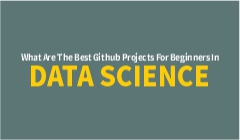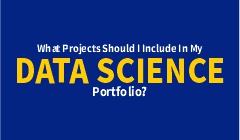
If you're a data science beginner, one of the quickest methods to enhance your skills and create a respectable portfolio is contributing to GitHub projects. GitHub is not just a repository of code—it's a site where aspiring and seasoned data scientists work together, learn from one another, and demonstrate their proficiency.
For beginners, starting with beginner-friendly data science projects on GitHub can make learning more practical and enjoyable. You’ll get hands-on experience with datasets, machine learning algorithms, and real-world problem-solving. Moreover, recruiters often look at GitHub profiles to assess a candidate’s coding style, project diversity, and problem-solving capabilities.
This blog will take you through some of the top GitHub projects for data science beginners, what you'll learn from them, and tips to begin.
Why GitHub Projects Are Important for Data Science Beginners
Let's first see why contributing to GitHub projects is important before we take a look at recommendations:
Types of Beginner-Friendly Data Science Projects on GitHub
As a beginner, you should begin with projects that are:
Top GitHub Projects for Data Science Beginners
Following is a collection of GitHub project ideas and topics that are ideal for beginners, along with the skills they enable.
1. Exploratory Data Analysis (EDA) Projects
Why EDA projects?
Exploratory Data Analysis assists you in comprehending the structure, patterns, and trends in a dataset prior to fitting any machine learning models.
Example project ideas:
Skills acquired:
2. Data Cleaning and Preprocessing Projects
Why it's beginner-friendly:
Data cleaning is a skill that all data scientists should have. These projects show you how to deal with missing values, drop duplicates, and normalize data.
Example project ideas:
Skills acquired:
3. Machine Learning Beginner Projects
Why it's beginner-friendly:
Machine learning projects provide you with practical experience in predictive modeling without needing extensive AI knowledge at first.
Some example project ideas:
Things you would learn:
4. Sentiment Analysis Projects
Why it's beginner-friendly:
Sentiment analysis lets you explore Natural Language Processing (NLP) and is easy and enjoyable to work on.
Project ideas:
Skills covered:
5. Recommendation System Projects
Why it's beginner-friendly:
Recommendation systems are extremely practical and beginner-level implementations are quite simple.
Project ideas:
Skills acquired:
6. Time Series Forecasting Projects
Why it's beginner-friendly:
Time series analysis is crucial for financial, weather, and sales forecasting. Beginner projects are easy but effective.
Example project ideas:
Skills acquired:
7. Image Classification Projects
Why it's beginner-friendly:
Manipulating image data exposes beginners to computer vision with less overwhelming complexity.
Example project ideas:
Skills learned:
How to Start Contributing to GitHub Projects as a Beginner
Most new users are afraid to make additions to GitHub projects as they believe they must be professionals. The truth is, you can begin small:
Fork and Clone – Duplicate a repository to your account and play around locally.
Work on Documentation – Enhance README files and comments on code.
Fix Minor Bugs – Begin with easy issues labeled as "good first issue."
Add New Features Gradually – After feeling comfortable, add more project functionality.
Tips for Building an Impressive GitHub Data Science Portfolio
Benefits of Working on Beginner GitHub Data Science Projects
Common Mistakes Beginners Make on GitHub
Conclusion
Learning data science for the first time can seem daunting, but practicing on beginner-friendly GitHub projects is a game-changer. Not only will you be learning from experience, but you'll also have a portfolio to demonstrate your abilities to potential employers.
Regardless of whether you opt for EDA, sentiment analysis, machine learning, or recommendation system projects, the essence is to remain consistent, continue learning, and get involved in the community. These small contributions will eventually show you a robust portfolio and career development in data science over time.
.jpg)
Introduction
Beginning with a mini project in data science is one of the best methods for bridging theoretical knowledge and practical skills. Whether you're a newcomer or want to boost your resume, a well-crafted mini project indicates that you're capable of handling data, exercising analytical thinking, and providing insights. Mini projects are easy to handle, faster to finish, and give you the freedom to try new techniques without excessive complexity compared to big projects.
In this tutorial, we will take you through the step-by-step process of executing a mini project in data science, cover best practices, and provide examples to help you differentiate yourself in the job market.
A mini project provides more than a coding exercise it provides the chance for you to:
Step-by-Step Guide: How to Do a Mini Project in Data Science
Step 1: Identify Your Objective
You should understand the problem that you aim to solve before initiating any data science project.
Hints to determine a good project objective:
Sample objectives:
Step 2: Select a Dataset
A dataset is the basis of your project. For a mini project, seek datasets that are:
Good guidelines for dataset selection:
Step 3: Know and Get Familiar with the Data (EDA)
Exploratory Data Analysis (EDA) assists you in comprehending the structure, patterns, and possible issues of the dataset.
Major tasks in EDA:
Typical tools for EDA:
Step 4: Data Cleaning and Preprocessing
Even mini projects need data preprocessing to make it accurate.
Cleaning steps:
Why it matters: Clean data enhances model performance and trustworthiness.
Step 5: Choose the Right Model or Approach
Depending on project type, select a suitable method:
Step 6: Train, Test, and Evaluate the Model
Steps to evaluate the model:
Step 7: Visualize and Interpret Results
Visualization is necessary—it makes your findings comprehensible and interesting.
Visualization tools:
Step 8: Document Your Project
A documented project reflects professionalism. Include:
Step 9: Share Your Project
To grow professionally, share your mini project:
Here are some easy-to-use mini project ideas to get you started:
Best Practices for a Successful Mini Project in Data Science
How to Make Your Mini Project Stand Out
Problems to Avoid
Estimated Timeline for a Mini Project
A basic mini project can be done within 5–10 days with the following split:
Day 1: Define problem & get dataset.
Day 2–3: Conduct EDA.
Day 4–5: Data preprocessing & cleaning.
Day 6–7: Model building & testing.
Day 8: Visualize results.
Day 9: Document findings.
Day 10: Publish and share.
Conclusion
Conducting a mini project in data science is one of the quickest methods of learning through practice. It lets you put steps such as data collection, cleaning, analysis, modeling, and visualization into action while maintaining a small scope. Begin with a trivial but significant problem, write down your work with proper documentation, and publish it to the data science community.
By using the formal approach described below, you will not only enhance your technical ability but also develop a portfolio of actual projects to showcase, which can assist you in getting internships, freelance work, or a full-time job in data science.

In the modern-day competitive technology job market, your data science portfolio is as crucial as your resume. It's not just about qualifications—recruiters and hiring managers also want to see you implement your skills to solve actual problems. An effective portfolio differentiates you by demonstrating your capability to work with datasets, develop models, create visualization, and design solutions that hold practical relevance.
Regardless of whether you're a novice in data science or a seasoned professional looking to transition into a new career, the quality and diversity of your portfolio projects have an impact on hiring. The appropriate projects illustrate your technical capability, imagination, and business problem-solving abilities—exactly what employers are looking for in a data scientist.
In this post, we are going to look at the types of projects that you want to put in your data science portfolio, why they are so important, and how you should organize them for optimal effect.
Why a Data Science Portfolio is Vital
Before we look at particular project ideas, it's worth noting why portfolios are so critical:
Demonstration of Skills – Hiring managers get to see actual code, visualizations, and outcomes instead of reading about it on a resume.
Differentiation – A solid portfolio distinguishes you from those with comparable academic credentials.
Practical Application – Illustrates the ability to apply skills in real-world scenarios, rather than solely theoretical ones.
Continuous Learning – Reflects your dedication to staying current with skills.
Personal Branding – Assists in establishing a professional web presence that can generate job interest.
Key Elements Every Data Science Project Should Have
Prior to choosing which projects to include, make sure they have:
Best Project Ideas for Your Data Science Portfolio
Here are some categories and examples that work well for portfolio-building.
1. Data Cleaning and Preprocessing Projects
Why it matters:
A large portion of a data scientist’s job involves preparing data for analysis. Demonstrating your ability to handle messy datasets is crucial.
Examples:
Skills Highlighted:
2. Exploratory Data Analysis (EDA) Projects
Why it matters:
EDA demonstrates your skill to discover insights and patterns prior to modeling.
Examples:
Skills Highlighted:
3. Machine Learning Model Projects
Why it matters:
Demonstrates your skill to develop, train, and test predictive models.
Examples:
Skills Highlighted:
4. Natural Language Processing (NLP) Projects
Why it matters:
NLP is a highly desirable skill in data science jobs dealing with unstructured text data.
Examples:
Skills Highlighted:
5. Time Series Forecasting Projects
Why it matters:
Forecasting is applied across finance, retail, supply chain, and a great many industries.
Examples:
Skills Emphasized:
6. Computer Vision Projects
Why it matters:
If your target job is working with image data, computer vision projects will pop out.
Examples:
Skills Emphasized:
7. Data Visualization Dashboards
Why it matters:
Dashboards demonstrate your skill for presenting data in a decision-maker-friendly way.
Examples:
Skills Highlighted:
8. End-to-End Business Case Studies
Why it matters:
Employers prefer to see projects simulating the complete data science pipeline.
Examples:
Skills Highlighted:
Tips for Presenting Your Data Science Portfolio
How Many Projects Should You Have?
An average portfolio typically contains:
This diversity makes sure you show both breadth and depth in your skill set.
Common Mistakes to Avoid
Conclusion
Your data science portfolio is your professional portfolio—it should demonstrate both your technical skill and comprehension of practical business issues. Mix data cleaning, EDA, machine learning, NLP, time series, visualization, and end-to-end projects. Ensure each project is well-documented, visually appealing, and effectively conveys the problem-solving process.
With the perfect balance of projects and well-rehearsed presentation, your portfolio will place you ahead of the pack in the competitive world of data science and gain you your next professional move.